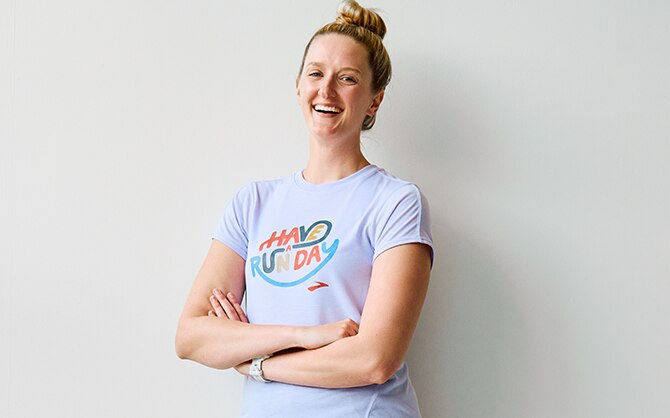Beginner strength training for runners

Run Happy team member and run/strength coach Dr Kate Bochnewetch shares five beginner upper body exercises to improve your run.
Meet Dr Kate
Dr Kate Bochnewetch is a lifelong runner, but her joy in the sport extends beyond her own experiences with the run. As a physical therapist, Road Runners Club of America coach, and certified gait analyst, Kate is passionate about helping runners find balance in their training. She also finds joy in working with runners to get stronger and return from injury.

Why is strength training important for runners?
Dr Kate believes it's important to include upper body strengthening into runners' workouts so they can achieve stronger, better, longer runs.
“While there’s no one ideal running form, fatigue can leave us with a less than optimal posture. Having a strong upper body can help improve and maintain an upright posture and a strong arm drive throughout your run."
According to Dr Kate, runners tend to focus on their abdominal muscles when working their core and often forget that back muscles are also an important part of our core. Many upper body strengthening exercises often also challenge your back muscles and other core muscles.
“We know that strength training in general can help improve running economy and prevent injury. But there isn’t much research out there focusing specifically on upper body strengthening. However, there is research suggesting upper body and core fatigue may negatively impact running economy”, she said.
Add these exercises to your routine
Looking for upper body strength training for runners? Dr Kate shared five exercises that are perfect for those who are new to strength training.
Superman hold
Lay flat facing down in a prone position. Keep your legs straight and your arms extended in front of you. You should look like you’re flying. Keep your head in a neutral position and slowly lift your legs and arms at the same time until they’re about six inches off the floor. Try to engage your core, shoulder blades and glutes all at the same time. Hold for 30 seconds. Special equipment: yoga mat. Muscles worked: deltoids, upper/mid/lower back (trapezius, erector spinae), posterior chain
Elevated push-up
Using the seat of a sturdy chair, put yourself into a standard push-up position. Grab hold of the sides of the seat. Keep your legs straight and your body at about a 45-degree angle. Keep your elbows tucked and close to your body, engage your core, and lower yourself toward the chair. Push yourself back up to the starting position and repeat. Special equipment: chair. Muscles worked: lower pectorals lower, deltoids, triceps
Banded seat row
Sit on the floor and extend your legs. Loop one end of a resistance band around your feet and hold the other end in each hand. Squeeze your shoulder blades while you pull the band toward your waistline. Slowly release the tension and return to your starting row position and repeat. Special equipment: resistance band. Muscles worked: upper/mid back (trapezius), lats
Triceps dip
Sit on the edge of a chair or weight bench. Grip the edge of the chair or bench, extend your legs with your feet about hip-width apart. Push down against the chair or bench to lift your body off the seat so your butt is off the edge. Keep your heels on the ground and lower yourself until your elbows are bent between 45 and 90 degrees. Push up slowly until your arms are almost straight and repeat. Special equipment: chair or bench. Muscles worked: triceps
Side plank
With your legs extended and feet together, lie on your side with one forearm directly beneath your shoulder. Keep your head lined up with your spine. Contract your core and raise your hips until your body is in a straight line from head to toe. Hold this position for 30 seconds without letting your hips sag or move. Repeat on the opposite side. Special equipment: N/A. Muscles worked: abdominals (obliques), deltoids
Feeling strong and ready?
Head to our Run Happy Blog to explore other running workouts, training tips, gear stories, and much more. Be sure to follow Dr Kate Bochnewetch on Instagram and check out her coaching and PT business, The Running DPT.